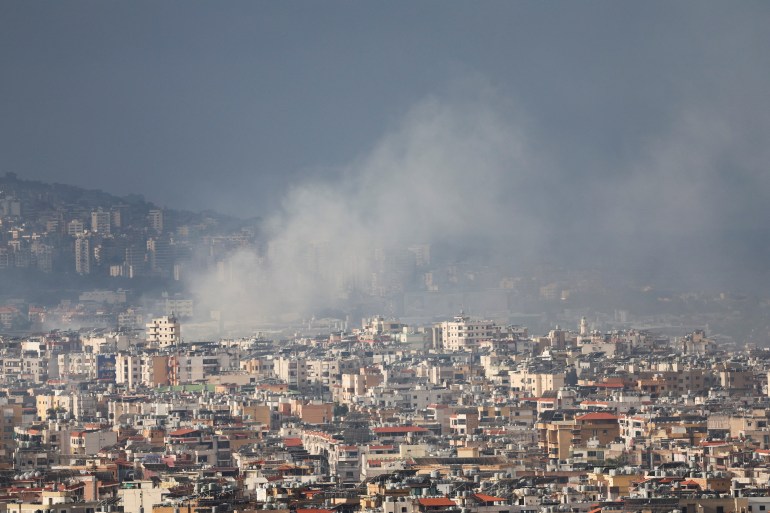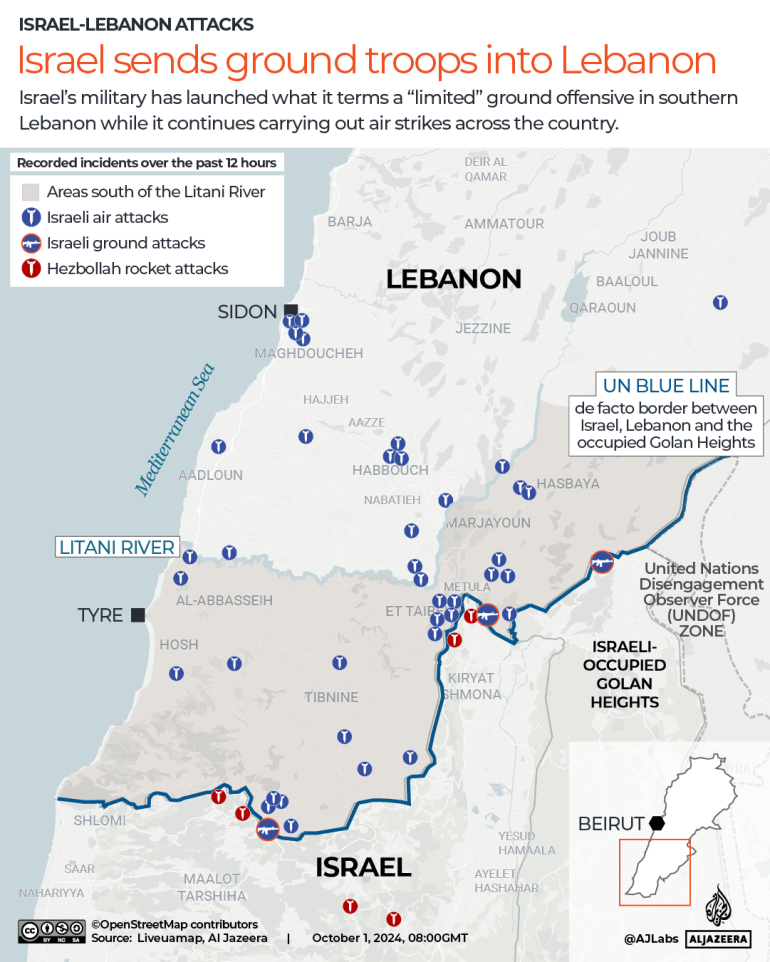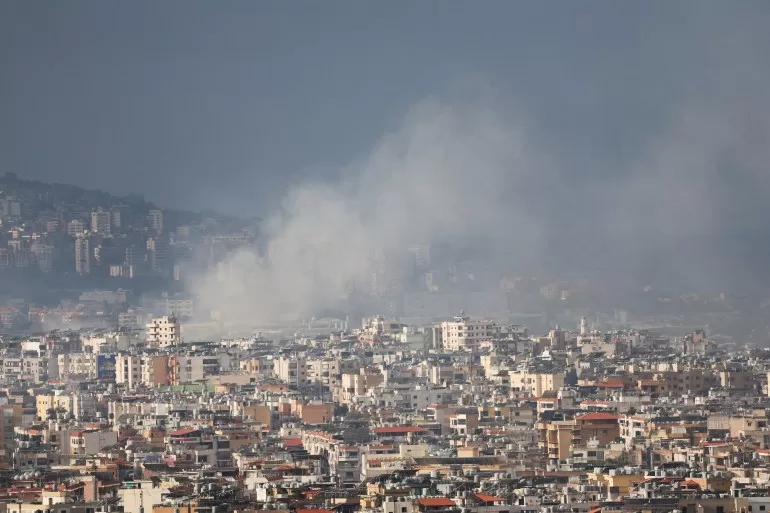EXPLAINER
As Israel intensifies its attacks on Lebanon, we examine its motives and what is known so far.
Israel has announced “ground raids” into southern Lebanon, escalating its military operations inside its northern neighbour’s territory.
The attacks, supported by air strikes and artillery, commenced early Tuesday morning, and Israel said it was targeting the Lebanese armed group Hezbollah in villages near the border with Israel.
But Hezbollah denied that Israeli troops had crossed over into Lebanon, even as experts cited mounting evidence pointing to an imminent Israeli invasion.
Here’s what we know about the latest developments.
What has Israel said?
- At around 2am (23:00 GMT), the Israeli military said its soldiers had started entering Lebanon “a few hours ago”, with “limited, localised, and targeted ground raids based on precise intelligence”.
- The offensive follows two weeks of intense attacks by Israel on Lebanon, including an air strike that resulted in the killing of Hezbollah’s leader, Hassan Nasrallah. According to Lebanon’s health ministry, attacks in the past 24 hours have resulted in at least 95 deaths across southern Lebanon, northeastern regions, and the capital, Beirut.
- On Tuesday, Israeli military spokesman Daniel Hagari emphasised that Israeli forces carried out limited and targeted raids.
- He added that Israeli forces have been conducting “dozens of operations” in southern Lebanon “in the last months”.
- The Lebanese National News Agency (NNA) said Israel struck several locations with air strikes, artillery shelling, and heavy machine gun fire on Tuesday.
- Israeli columnist Gideon Levy stated that Israel is in the initial phase of its ground operation in Lebanon, warning that the operation could become “complicated”.
- “Look at Gaza. Israel is stuck in Gaza without any clue how and when it will get out of Gaza,” Levy said. “The same might happen now in Lebanon.”
What has Hezbollah said?
- Hezbollah denied that Israeli forces crossed into the country.
- “All Zionist claims that [Israeli] occupation forces have entered Lebanon are false,” Hezbollah media relations official Mohammad Afif told Al Jazeera.
- Ali Rizk, a security and political affairs analyst based in Beirut, says Israeli troops attempted to “overwhelm” Hezbollah fighters but were repelled and forced to withdraw.
- “What the Israeli side might be doing is a propaganda war when they speak about successfully entering Lebanese territory. So this might be part of an Israeli psychological war, which wouldn’t be the first time they resort to such tactics,” Rizk told Al Jazeera.
Is an invasion imminent?
- Israel seems to suggest that an operation is imminent, but through limited and targeted raids that take aim at Hezbollah strongholds.
- “Our war is with Hezbollah, not with the people of Lebanon,” Hagari said.
- But Elijah Magnier, a security analyst, said rather than a limited ground operation, the Israeli force on the Lebanon border is growing in size and likely plans to surround and eliminate Hezbollah in southern Lebanon.
- “It is not what the Israelis are telling us. From open source [intelligence], we understand that the Israelis have prepared at least 18 brigades. So we are talking about between 70,000 and 100,000 soldiers,” Magnier told Al Jazeera.

Are aerial attacks happening, too?
Yes, in Lebanon, Israel — and beyond.
- In Lebanon: according to reports, an Israeli missile strike hit a building in the Ein el-Hilweh Palestinian refugee camp near the southern city of Sidon. This is the largest Palestinian refugee camp in the country.
- According to the NNA, Israel targeted sites in Lebanon’s Southern and Nabatieh governorates, both situated along Israel’s northern border with Lebanon.
- On Tuesday, the Israeli military also urged residents in more than two dozen villages in southern Lebanon to evacuate north of the Awali River, some 60km (nearly 40 miles) from the border.
- In Israel: The army said that five rockets were fired from Lebanon towards Metula, in northern Israel, with some being intercepted while others landed in uninhabited areas. Metula has a population of around 1,400 people.
- Hezbollah also said that it launched a salvo of “Fadi-4” rockets at the Glilot base, targeting Unit 8200 of military intelligence and the Mossad headquarters on the outskirts of Tel Aviv.
- In Syria, state media reported that a suspected Israeli attack on Damascus resulted in at least three people being killed on Tuesday.

What’s the broader context?
- Israeli forces and Hezbollah began exchanging fire last year when the group launched rockets in support of Gaza, which was being bombarded by Israel following a Hamas-led surprise attack on Israel on October 7.
- In the following months, the confrontation grew, and these exchanges forced more than 100,000 people on the Lebanese side of the border to flee their homes and communities while approximately 60,000 Israelis were internally displaced on the other side.
- During much of this period, the fighting was confined to a region near the borders. However, that shifted in mid-September, as Israel began pounding Beirut and other parts of Lebanon.
- Within a period of two weeks, Israel assassinated multiple Hezbollah commanders and finally Nasrallah. It also detonated electronic communication devices that killed 39 and injured thousands and conducted an extensive bombing campaign that resulted in more than 1,000 deaths in Lebanon, including dozens of children.
Why did Israel say it launched the operation?
- Israel’s principal stated goal is to secure northern Israel so that the thousands of displaced citizens can safely return to the area after a year of cross-border attacks.
- “We will use all the means at our disposal to achieve this goal,” Israeli Defence Minister Yoav Gallant said.
- Israel’s 36th Armoured Division is already positioned along the border with Lebanon. It mainly consists of artillery and tank brigades.
- The country’s 98th Paratrooper Division, which includes paratroopers, commandos and armoured brigades, has also been deployed along the border. This division has seen extensive combat in Gaza in the past year.
- “They have also sent in the 7th Armoured Brigade, which is the cream of their armoured units, as well. They are very well trained, very well backed up,” Al Jazeera’s Defence Editor Alex Gatopoulos said.
- But this doesn’t come without challenges, as experts say not all soldiers are experienced, “unlike some of the Hezbollah fighters”, Greg Stoker, a former United States Army ranger and geopolitical analyst, told Al Jazeera.
How might Hezbollah respond?
- Hezbollah, formed in 1982 at a time when Israel was occupying southern Lebanon, said that it had targeted Israeli troops along the border with artillery fire.
- On Monday, in the group’s first public broadcast since Nasrallah’s assassination, Hezbollah deputy chief Naim Qassem said the group was prepared for any potential Israeli ground incursion and a long war.
- The group is one of Israel’s biggest foes in the region and is among the pillars of Iran’s so-called Axis of Resistance against Israel and the controversial role of the US in the Middle East.
- “Hezbollah has a special forces unit called the Radwan Force that focuses especially on fighting in the south and they train solely in that location. Obviously, the mountainous terrain, rocky terrain, lends itself to ambushes and sniper attacks,” Gatopoulos explained.
- In 2006, during Israel’s last war in Lebanon, inexperienced Israeli units “were caught off-guard by Hezbollah’s training and were ambushed time and time and time again,” Gatopoulos said.
Have Israeli troops been in Lebanon before?
Yes in 2006, 1982 and 1978.
- In a cross-border raid in July 2006, Hezbollah captured two Israeli soldiers, which it hoped would secure a prisoner swap with the country.
- Israel responded militarily, resulting in a 34-day war. Neither side was able to prevail militarily, but more than 1,100 Lebanese and 165 Israelis were killed. Nasrallah often said the 2006 war was a success for Hezbollah, noting that it withstood Israel’s much larger forces.
- In 1982, the longest Israeli invasion of Lebanon started. As with this week’s operation, Israel said that the incursion would be short and limited, aiming to dismantle the Palestine Liberation Organization (PLO). However, it led to a lengthy occupation of southern Lebanon, for 18 years.
- And in 1978, Israel deployed troops across the border after members of the PLO entered Israel from Lebanon by sea, following an attack in Tel Aviv.
What have been the reactions?
- Several governments, including those of the United Kingdom, Germany and France, have arranged for the evacuation of their citizens from Lebanon.
- An undisclosed number of US troops have been placed on prepare-to-deploy orders for the Middle East, the Pentagon announced on Monday.
- In a call with Gallant, US Secretary of Defense Lloyd Austin said Washington supported Israel in the “necessity of dismantling [Hezbollah] attack infrastructure along the border” with Lebanon in order to prevent “October 7-style attacks on Israel’s northern communities”.
- For more on the reactions, read our story here.
